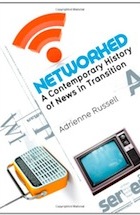Barbara Richter reviews an exciting new book on the future of journalism and news media, which will create debate amongst journalists, students and politicians alike.
Networked: A Contemporary History of News in Transition. Adrienne Russell. Polity. June 2011.
Find this book: ![]() Google Books
Google Books ![]() Amazon
Amazon
 The focus of Adrienne Russell’s Networked is the changing nature of the news industry: while the industry as we know it is in decline, journalism itself will adapt, and ultimately be fine. Russell, associate professor in the Digital Media Studies program at the University of Denver, argues that journalism is coming to change from something that is merely consumed by audiences, to something that lives and dies by audience participation.
The focus of Adrienne Russell’s Networked is the changing nature of the news industry: while the industry as we know it is in decline, journalism itself will adapt, and ultimately be fine. Russell, associate professor in the Digital Media Studies program at the University of Denver, argues that journalism is coming to change from something that is merely consumed by audiences, to something that lives and dies by audience participation.
The main reason for these changes is the spread of the internet. The news audience is transforming from passive consumers to active participants and members of news networks. Essentially everybody can now be a journalist, providing facts and images to the public and debating news from various sources, through blogs, Twitter and more interactive news coverage. This requires a broadening of the definition of news, from the mere statement of fact to anything that contributes to the public debate. The Daily Show is given as an example, but we could also reference youtube interviews with David Cameron, in which the Prime Minister answered questions sent in from viewers.
The future of news, says Russell, is rosier than is usually assumed: people want to stay informed, hence there will always be a need for news, but the mode of delivery is changing. Rather than providing the same news to everybody via national newspapers and syndicated television, the internet allows everyone to look for news on their specific subjects of interest. This leads to a decline in widely circulated newspapers, more than any major Murdoch-scandal ever could.
These changes in the mode of delivery and the people delivering them require a shift in the guiding principles of journalism: accountability and transparency need to replace objectivity. An increase in the variety of sources used leads to a better reporting of the “truth” as seen by different groups.
The author’s main policy recommendations are the safeguarding of net neutrality to preserve equality of voices and an expansion of the use of Creative Commons licenses to enable the spreading of news and images. In many ways Russell’s book is very encouraging: news is not dead. She describes the exciting possibilities of the journalism of the future, and this excitement is infectious. Her policy recommendations seem sensible too.
However, I do think the author is a little too optimistic. Russell devotes little attention to possible dangers in the change of how journalism is conducted. The main argument often given against citizen journalism is the lower quality of reporting and the difficulty of deciding in whom to trust. It is possible that these issues will be resolved with time and experience, but it is by no means certain. It might also take so long that standards are forever lowered. A fuller discussion of these issued would have been welcome.
Russell is also very optimistic about the reach of new media. These changes in journalism require all citizens to be connected to the internet and to be internet-literate. Over time, the share of the population fulfilling both requirements will likely increase, but it is not certain that it will ever be large enough to eradicate the need for traditional journalism. Also, most people have lives to lead and might find this new kind of journalism too demanding on their time. I’m also not sure that the reporting of different “truths” is such a phenomenal gain. In my, possibly naive, idea of journalism its goal is to find and report the truth, not what is considered true by different people.
This short book will be an interesting read for journalists and non-journalists alike, though possibly for different reasons. Most journalists will already have an opinion on the matter, so to them the book will be useful to confirm opinion or sharpen arguments. For the rest, it is a good starting point for forming an opinion on the future of journalism and the news.
Find this book: ![]() Google Books
Google Books ![]() Amazon
Amazon
Barbara Richter is a PhD student in economics at LSE.






